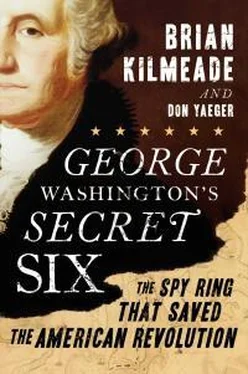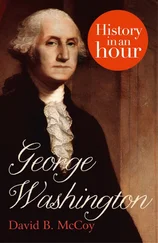As picturesque as Tallmadge’s transition back to civilian life was, his former commander George Washington would not have long to enjoy his own “shades of domestic retirement,” as James Rivington had wished for him. Despite making every effort to remain out of the public eye, on April 30, 1789, Washington once again found himself in New York City, the capital of the new nation. This time, however, his hand was resting not upon his sword but upon a Bible as he was sworn in to the office of president of the United States. He had not wanted the position and had only accepted reluctantly when he was finally persuaded that his leadership would help unify the former colonies of the infant nation that were still struggling on wobbling legs toward complete self-governance free of foreign presence or occupation. Washington also declined all other titles and honoraria other than the simple and direct address of “Mr. President.”
A DISAPPOINTING VISIT
The following year, Washington made a tour of Long Island to meet the people and examine the damage done to land and property during the British occupation. But he also had it in mind to privately visit with and thank the individuals who had risked so much to gather intelligence and smuggle it to him.
He approached Setauket on April 22, 1790, and made a stop at “the House of a Capt. Roe, which is tolerably dect. with obliging people in it.” Whether those obliging people with whom he passed several pleasant hours included the rest of the Setauket Culpers—Benjamin Tallmadge, Abraham Woodhull, and Caleb Brewster—or if he was even aware that he was lodging under the roof of one of those very spies he had journeyed to thank, Washington did not say. His knowledge of the ring members’ true identities was, after all, quite limited by design. He had not wanted to know more than he needed to in order to protect them, and several of the members (Townsend in particular) had been insistent that Washington never learn their names. The following day he took his leave of Roe’s tavern and continued westward, where his tour took him to Oyster Bay. His brief notes make no mention of a meeting with Robert Townsend or any member of his family, despite the senior Samuel’s numerous run-ins with the law and his suffering as Colonel Simcoe’s reluctant landlord. Had Washington been aware of the debt of gratitude that he owed to a certain native son of this town, his stay surely would not have been so brief. Instead, he made his visit, paid his respects to the brave citizens of the town, and rode on, having never met the man he so earnestly sought to thank.
By the time the president crossed the ferry back to Manhattan at sundown on April 24, he had completed his circuit around the part of the island wherein lived the ring of spies who had served him so faithfully and carried out their weighty task with such dedication and courage. He had sincerely hoped to have some time with the mysterious Culper Junior, who had risked his life, health, and well-being for so long, passing in and out of the lion’s mouth every day, seeking to still the monarch’s roar within American borders. But no matter the greetings sent the general’s way and the invitations extended, Townsend never stepped out of the shadows to meet with his commander in chief. It was a great honor, to be sure, but not one that Townsend sought. He did not want praise or celebration; the greatest reward Washington could give him was simply a return to a quiet and unassuming life as a man subject to no king but God.
Those few who knew the Culpers’ secret kept it close, and all Washington could do was carry in his heart the gratitude he had for the sacrifices of his brave spies, which were no less meaningful for having been made in city streets and country back roads as on a battlefield. For these men and women, too, had given their all to “establish Justice, insure domestic Tranquility, provide for the common defence, promote the general Welfare, and secure the Blessings of Liberty to ourselves and our Posterity.”
CHAPTER 18 Life After the Ring
With the end of the war and the start of the American republic, the Culpers could return to their lives as ordinary citizens. While a few were not shy about their role in the war effort and enjoyed a bit of notoriety for their daring adventures, most did what all good spies do: They carried on in obscurity as ordinary and unassuming people whose neighbors never knew they had led double lives. Their stories were packed away like pressed flowers in the pages of a book—quietly waiting, undetected for years—to reward some curious reader decades later with the intricacy and beauty of their design. There were whispers, rumors, and legends, of course—but no one pursued them, happy to leave well enough alone when the desired outcome of liberty had been reached, though at a high and terrible cost.
Caleb Brewster,after his years of excitement rowing back and forth across Long Island Sound in his whaleboat and engaging in hard-fought skirmishes, found that the second part of his life was much quieter than the first, though he was never far from the sea. He married Anne Lewis of Fairfield, Connecticut, in 1784, and moved to a farm at Black Rock, southwest of Bridgeport, where the couple had several children. Brewster passed away at his farm on February 13, 1827, and for all of his prodigious feats of bravery and skill during the war, his headstone notes his eventual rank of captain and then sums up his service simply: “He was a brave and active officer of the Revolution.”
James Rivingtonhad a less tranquil retirement. According to George Washington Parke Custis, during the private meeting between Washington and Rivington in the bookshop, the officers in the front room could distinctly hear a bag of gold coins being handed to the bookseller for his spying services during the war. Custis, however, was not actually present for the events and had a habit of occasionally embellishing stories in accordance with his own imagination. Whether gold really changed hands during this meeting or not remains unclear. But what is certain is that Rivington and his shop received special protection in the days and weeks following the British evacuation; there would be no burning and looting as had occurred at the hands of the Sons of Liberty in 1775. Later correspondence of Washington’s confidants defended Rivington against libel. He remained in New York, though his newspaper business suffered because of his reputation as a staunch enemy of the new republic. He was eventually forced to close his shop, but with eight children to support back in England, several bad investments, and a personal taste for the high life, his financial situation deteriorated until he was forced to serve time in debtors’ prison. He died in New York, where he had spent thirty-six of his seventy-eight years of life, on July 4, 1802.
Austin Roe,like Caleb Brewster, achieved the rank of captain and carried that title proudly for the rest of his life. He and his wife, the former Catherine Jones, had eight children; in 1798, the family moved from Setauket, on the north shore of Long Island, to Patchogue, almost exactly opposite on the southern shore, and opened a hotel. Unlike many of the other Culpers, Roe enjoyed sharing stories of his spying adventures with locals and patrons at his inn, though he was careful to protect the privacy of his fellow ring members. He passed away on November 29, 1830, at the age of eighty-one.
Benjamin Tallmadgemarried Mary Floyd, daughter of Major General William Floyd, a signer of the Declaration of Independence. The couple moved to Connecticut, where they had seven children; in 1792, Tallmadge was appointed postmaster for the town of Litchfield. He would later serve sixteen years in the House of Representatives (1801–17). Interestingly, in January 1817, one of the final matters Tallmadge undertook as a congressman before leaving office was to campaign against granting a pension to the three men (John Paulding, Isaac Van Wart, and David Williams) who first captured John André. According to a popular weekly circular of the time, Tallmadge argued that the men were hardly heroes, despite their public image, but were, in fact, “of that class of people who passed between both armies, as often in one camp as in the other.” His objection was rooted in the fact that “when Major André’s boots were taken off by them, it was to search for plunder, and not to detect treason. . . . If André could have given to these men the amount they demanded for his release, he never would have been hung for a spy, nor in captivity.” Tallmadge died on March 7, 1835. He was eighty-one years old.
Читать дальше












